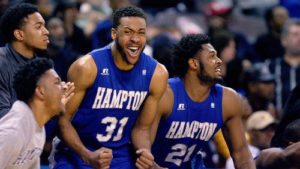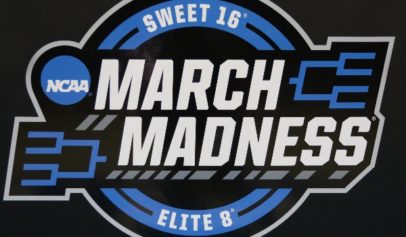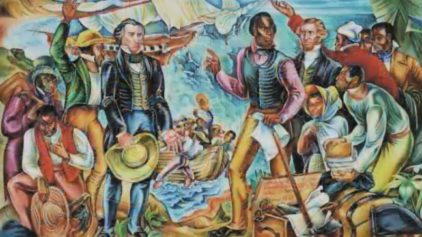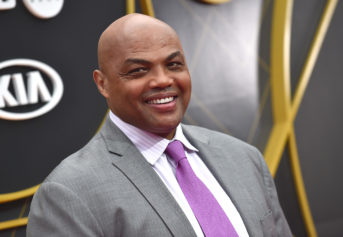
As hard as the Pirate fans were rooting for them to earn their second-ever NCAA Tournament victory, there were thousands of HBCU alums around the country putting aside their schools for a moment to cheer on one of their own.
When it comes to Black colleges, the two that make it into March Madness become the favorites of all HBCU students, graduates and just about anyone who has partied at one of their homecomings.
Hampton represented, as they say, earning the right to face undefeated and consensus eventual champion Kentucky on Thursday. That outcome might be inevitable, but that’s beside the point.
HBCU athletes, while certainly less-financed and less-supported than majority schools, remain a powerful source of their school’s pride. So, when the Pirates “upset’ Manhattan by 10 points last night, ESPN anchor Stan Verrett pulled hard for Hampton to get the win.
You see, Verrett is firmly entrenched in the HBCU culture. He pledged Alpha Phi Alpha fraternity and graduated from Howard University. He understands the significance of an historically Black college winning on a national stage.
So, during SportsCenter last night, Verrett waxed about Hampton University being known by Howard folks as “Little HU.”
“But they were Big HU last night,” he said, proudly.
Three years ago, Norfolk State, Hampton’s rival from the other side of the Chesapeake Bay, made its first NCAA Tournament experience quite memorable, defeating Missouri in a first-round upset that stunned much of the college basketball-watching nation. As much as Hampton loves to beat Norfolk State—and vice versa—they root for each other during March Madness because of the bigger picture.
And that bigger picture is this: HBCUs are one. Texas Southern faces second-seeded Arizona State in the first round on Thursday, and you can bet that all associated with the SWAC, MEAC, CIAA, SIAC, etc., will be pulling for an upset.
No one at HBCUs is silly. There is no expectation to get to the Final Four—or, in most cases, even get beyond the first round. But there is a pride that each team represents the other. There is a thread woven from one HBCU to the next, creating a connection that makes rivalries obsolete when it comes to March Madness. That kind of bond does not exist among majority schools. If Duke loses, its fans will not be rooting for North Carolina.
Additionally, HBCUs are a casualty of integration. Almost everyone wanted an end of segregation, but the fallout eventually resulted in the top athletes that once all attended HBCUs no longer turning there.
Consider these players who were among the best in the game went to HBCUs when it was either impossible or unpopular to attend majority schools: Hall of Famers Earl (The Pearl) Monroe (Winston Salem) and Willis Reed (Grambling); the late Earl Lloyd (West Virginia State), the first Black person to play in an NBA game; Bobby Dandridge (Norfolk State), who just had his jersey retired by the Milwaukee Bucks; Dick Barnett (Tennessee State) of the champion New York Knicks of 1972; Sam Jones (North Carolina Central), the great Boston Celtic shooting guard. And there are many others from those eras who where equally talented but received less fanfare.
Also consider these more recent HBCU players who were outstanding in the NBA: Charles Oakley and Ben Wallace (Virginia Union); Rick Mahorn (Hampton); Avery Johnson (Southern); Darryl Armstrong (Fayetteville State); Purvis Short (Alcorn State); Harold Ellis (Morehouse) and on and on.
This does not diminish the fact that, mostly for reasons of exposure, the top ballplayers do not even consider playing at an HBCU.
It is a reality that the schools have accepted, but not happily. One argument is that scouting is so widespread that there hardly is a player the NBA would not discover. So why not play at an HBCU, flourish and feel “at home”—and not have to deal with feeling ostracized or have to endure what athletes at Oklahoma have had to when racist fraternities decide they want to chant about hanging you?
That subject is a matter worth delving deeper into at a later date. Right now, there remains more basking to do over Hampton’s win that represents all HBCUs. Barring an act never before seen in NCAA Tournament history, the feel-good nature of 2015 March Madness is about to emphatically end on Thursday.
So excuse HBCU supporters in general and Hampton Pirates in particular if they are giddy up until jump ball against Kentucky on Thursday. It’s been 14 years since Hampton upset No. 2 Iowa State in the tournament and three years since Norfolk State beat Mizzou in 2012. Knocking off Manhattan in the early game does not match up, but reminds the country that there are some ballers and a lot of pride at HBCUs.


